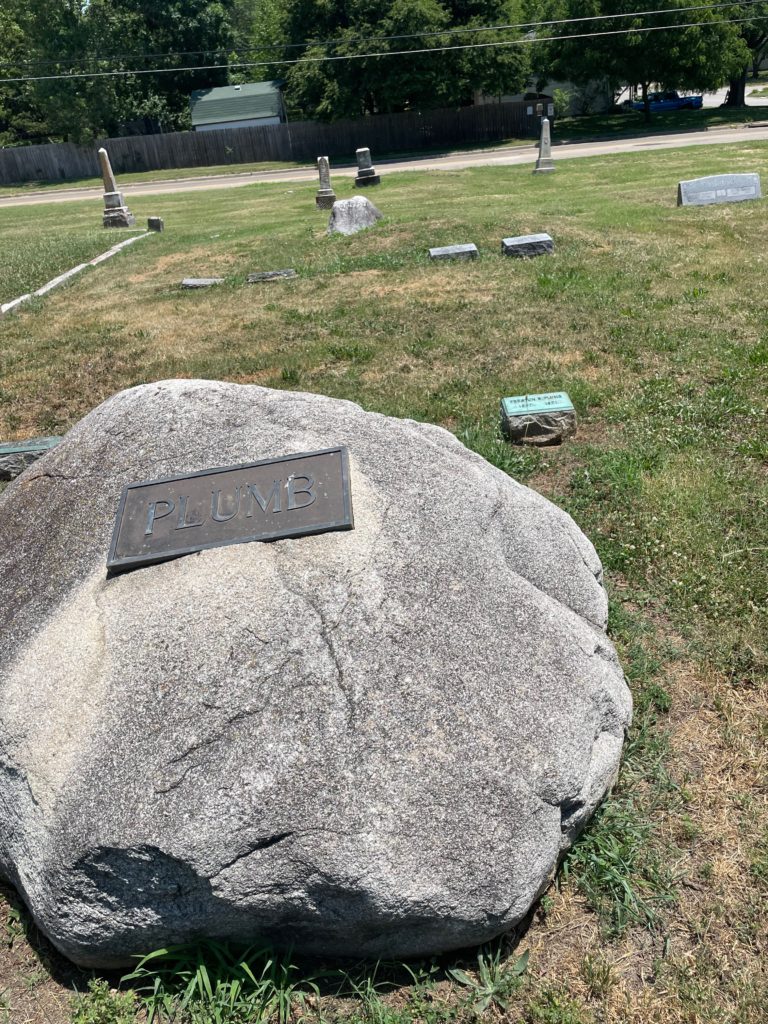Erik Visits an American Grave, Part 991
This is the grave of Preston Plumb.

Born in 1837 in Delaware County, Ohio, he grew up in Marysville and moved very fast in school. He went to some precursor of Kenyon College when he was only 11 years old, mostly to train as a printer. He did that for three years, came home, and went into the printing trade.
An abolitionist like John Brown, Plumb moved to Kansas in 1856 to support the free state movement. He moved to the new town of Emporia and started a newspaper there. He was a big early political player, despite not even being 20 years old. He was one of the leading abolitionists in the territory and helped organize the constitutional convention that brought the state into the nation as a free state. Since he was a rising star with an influential newspaper, the next step was to pass the bar, which he did in 1861. He was then elected to the Kansas legislature. He was known for his fiery speeches against slavery.
Plumb’s political career was interrupted by the South committing treason in defense of slavery, a cause about which we already know Plumb felt strongly. He volunteered as a second lieutenant in the Kansas 11th and fought the brutal border war with the pro-treason forces in Missouri, eventually rising to a colonel in the regiment. He was known as a good recruiter who pushed reluctant locals to put nation over family or personal comfort.
Plumb went back to the state legislature after the war. In 1876, his friends in the legislature gave him the promotion to the Senate. Not the Kansas version, the U.S. version. He was just a reliable Gilded Age Republican, not much more. He was a steady vote. He was reelected in 1882 and 1888. As time went on, Plumb took on a more Populist mode, supporting the People’s Party agenda. A lot of this was more pressure coming from the state’s increasingly angry and impoverished farmers than really caring that deeply about the issues. For example, he was extremely torn on supporting a federal elections bill in 1890 that could have addressed some of the loss of suffrage for Black voters in the South, but he was hesitant, despite his own passion on the issue, because the people of Kansas, despite the background of that state as so strongly anti-slavery and with many of those people who had fought the slavers still alive, were furious that their senators were paying attention to Black people in the South instead of pushing for relief for them. So he feinted a bit and introduced a free silver bill. Glad to see a lot has changed in rural Kansas.
Plumb was also a horrible dresser. It became a kind of joke in the Senate, especially during an era where it was a sign of wealth to dress to the nines. He was often mistaken for a doorman because he did not look or dress like a senator. Have to say that I respect that. To say the least, he was very anti-Indian and complained bitterly about the Dawes Act because it left any land for the tribes at all, preferring extermination. Being pro-genocide was pretty common for abolitionists. He also was an early leader on conservation and public lands. In addition, he was a leader of the anti-alcohol senators. He was an early supporter of Benjamin Harrison because of his crusade against gerrymandering. Exciting stuff.
Plumb died in 1891. He was 54 years old. Not entirely sure how he died.
Preston Plumb is buried in Maplewood Cemetery, Emporia, Kansas.
If you would like this series to visit other senators first appointed in 1876, you can donate to cover the required expenses here. Richard Coke is in Waco, Texas and Augustus Garland is in Little Rock, Arkansas. Previous posts in this series are archived here.


